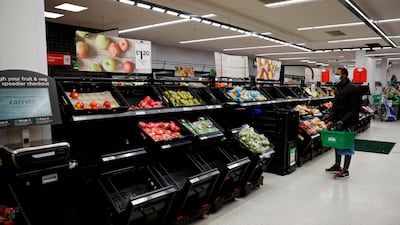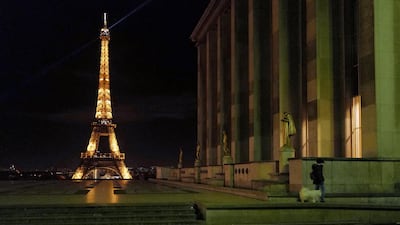France has agreed to open its borders to travellers leaving the UK for the first time since the UK revealed a highly infectious mutated form of coronavirus was spreading through the country.
The country will allow EU citizens, Britons and nationals of other countries who normally reside in the EU to travel from Britain from Wednesday, the French prime minister's office said.
All travellers will be required to show a negative Covid-19 test no more than 72 hours old, and the test must be capable of detecting the new variant of coronavirus.
"Good progress today and agreement with the French Government on borders," British Transport Secretary Grant Shapps tweeted. "We will provide an update on hauliers later this evening, but hauliers must still NOT travel to Kent this evening."
France led the way in closing the borders after details of the mutant virus, which is 70 per cent more infectious than the earlier incarnation, were revealed on Saturday..
Hours before the French decision, the European Union urged its 27 member states to end travel bans with the UK
UK scientists identified a new strain of the virus prompting more than 40 countries to suspend flights from the UK. But European nations including France, Germany, Denmark and the Netherlands also identified cases of the faster-spreading strain.
On Tuesday, Commissioner for Justice Didier Reynders said: “Blanket travel bans should not prevent thousands of EU and UK citizens from returning to their homes.”
The most stringent restrictions were imposed by France, which closed its borders to all travel from the UK for 48 hours from Sunday night, including hauliers carrying goods on the key Dover-to-Calais ferry route.
More than 1,500 lorries queued outside the southern coastal port of Dover.
The EU Commission recommended on Tuesday that "transport staff within the EU should be exempted from any travel ban across any border and from testing and quarantine requirements when they are travelling across a border to and from a vessel, vehicle, or aircraft".
It said the measure would apply to the UK until the end of the year when it is scheduled to sever all its links with the bloc after Brexit, unless a late deal is struck.
The UK is facing huge economic upheaval with a deal increasingly unlikely with its largest trading partner. Billions were wiped off the value of the UK’s top 100 companies with the leading FTSE index down more than 2.5 per cent on Monday. On Tuesday, it dropped 0.2 per cent with materials and energy shares leading the decline.
The new strain is up to 70 per cent more infectious and led the British government at the weekend to introduce tighter restrictions on London and surrounding areas.
On Tuesday, the UK's Department of Health said there had been 691 Covid-related deaths, the highest daily increase since November 25. A record number of new infections were also reported after 36,804 people tested positive for the virus.
Jeffrey Barrett, lead Covid-19 statistical geneticist at Covid-19 Genomics UK, said the consortium sampled cases around the UK and found the variant in the south-west, Midlands and north of England, areas under Tier 2 and 3 restrictions.
He said on Tuesday: “It is certainly not isolated in one place, it has begun to spread to many places in England.”
Chief scientific officer Sir Patrick Vallance said on Monday that the new strain was already being seen elsewhere in the UK and therefore tighter restrictions were likely to be imposed.
Meanwhile, Ireland will impose another strict lockdown amid “enormous concern” over the spread of the virus with cases rising at an alarming rate.
Restaurants, pubs and most shops in the country will shut on Christmas Eve and may not open again until early March, the government said on Tuesday.
Prime Minister Micheal Martin said there was no evidence that a new, virulent variant of the virus that has isolated Britain had reached Ireland but the safest approach was to assume it had.
Ireland has one of the lowest incidence rates of Covid-19 in Europe having moved early in October to temporarily shut parts of the economy during the second wave. However, daily cases are now rising by 10 per cent in what health chiefs say is clearly a third wave of infections.
"One of the real concerns that we have is that unlike the second wave, the virus seems to be affecting older people in quite high numbers and that is causing us enormous concern," Deputy Prime Minister Leo Varadkar said.
Hairdressers will be shut, while hotels can be used only to accommodate essential workers. Schools and childcare facilities will not be affected and the measures will be reviewed on January 12.
The travel restrictions from Britain come at a difficult time for many British companies, which are engaged in last-minute stockpiling before December 31, when a status quo transition period with the European Union ends and new Customs rules come into effect.
The prime minister’s official spokesman said talks between the two sides were continuing to try to resolve “significant differences” and that the discussions were difficult.
Meanwhile, the co-founder of BioNTech said on Tuesday it was "highly likely" that its vaccine against the coronavirus works against the mutated strain detected in Britain, but it could also adapt the vaccine, if necessary.
"Scientifically, it is highly likely that the immune response by this vaccine can also deal with the new virus variant," Ugur Sahin said.
"In principle, the beauty of the messenger technology is that we can directly start to engineer a vaccine which completely mimics this new mutation – we could be able to provide a new vaccine technically within six weeks."
The coronavirus is constantly changing as it spreads around the world. No mutated virus has so far been proved to be more virulent than others or able to easily overcome the barriers, such as social distancing, face masks and frequent hand-washing, which are currently recommended.




















